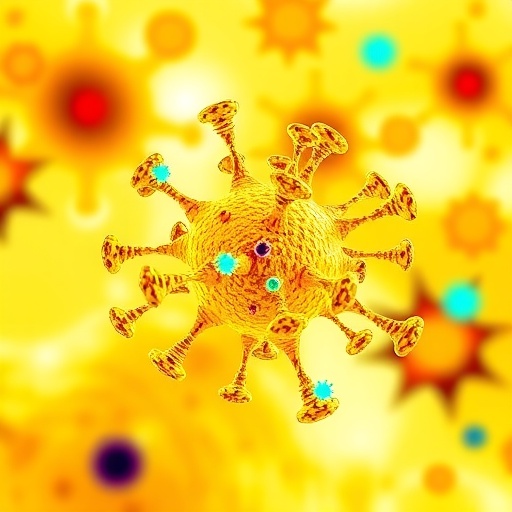In a groundbreaking development at the intersection of computational biology and immunotherapy, researchers have embarked on a novel approach to identify cross-reactive T-cell receptor (TCR) epitopes using an innovative computational framework known as ARDitox. This work, conducted by a team led by Pienkowski, Boschert, and Skoczylas, presents a significant advance in understanding how immune responses can be harnessed to combat various cancers more effectively. The research, published in the Journal of Cancer Research and Clinical Oncology, addresses two critical challenges in cancer treatment: the specificity of immune responses and the ability to recognize diverse tumor antigens.
Cancer immunotherapy, particularly through the use of TCRs, has shown great promise in recent years. However, one of the major obstacles faced by scientists is the identification of TCRs that can robustly recognize multiple tumor-associated antigens, given the vast diversity of mutations present in cancer cells. T-cells play an essential role in the body’s immune response by recognizing and destroying aberrant cells, yet the precise targeting of these cells has often been hampered by a lack of effective epitope identification methods.
The ARDitox framework introduced in this study employs advanced computational algorithms to analyze and predict TCR interactions with various epitopes. This method capitalizes on large datasets of TCR sequences and known epitopes, enabling researchers to develop predictive models that can capture the essence of cross-reactivity in TCRs. By harnessing machine learning techniques, they were able to refine their predictions, ultimately aiming to enhance the precision of TCR-based therapies.
Through extensive computational simulations and analyses, the researchers were able to identify a series of cross-reactive TCR epitopes. This discovery has the potential to revolutionize the development of TCR-engineered T-cell therapies, allowing for a more tailored and effective approach to cancer treatment. The ability to engage multiple targets with a single TCR could lead to more robust immune responses and improved clinical outcomes for patients.
The researchers emphasize that the implications of these findings extend beyond cancer treatment. The methodology and tools developed in this study could also be instrumental in vaccine development, especially in creating vaccines that target multiple strains of pathogens. The ability to predict how TCRs will behave in the presence of various antigens can lead to more effective and durable vaccine strategies, demonstrating the versatility of ARDitox beyond oncology.
Furthermore, an important aspect of this research is the collaboration between computational scientists and immunologists. This interdisciplinary approach has enabled the team to not only develop advanced algorithms but also to validate their findings through experimental studies. Such collaborations are essential for bridging the gap between theoretical predictions and practical applications, ultimately enhancing the speed and efficacy of biomedical research.
As researchers continue to decode the complex nature of the immune response, studies like this pave the way for improved treatment paradigms. The advent of ARDitox represents a significant step forward in utilizing computational approaches to gain insights into TCR cross-reactivity. The capacity to map and exploit these interactions could empower a new generation of immunotherapeutic agents, targeting specific cancer types or potentially even eradicating residual disease.
Despite the promise of such advancements, the researchers acknowledge that there are still significant challenges ahead. The dynamic nature of the immune system, with its ability to develop resistance to therapies, necessitates ongoing research. Future studies will be required to further refine ARDitox and to ensure that the predictions made through this framework hold true in clinical settings.
The publication of these findings marks an important milestone in the cancer research community. As researchers delve deeper into the vast potential of TCRs, the insights gained from ARDitox could lead to life-saving treatments for patients who have run out of options. The hope is that by enhancing our understanding of TCR interactions, we can create more effective and personalized therapies that truly harness the power of the immune system in the fight against cancer.
In addition to potential applications in cancer therapy, the research presents a tantalizing glimpse of the future. Other diseases, including autoimmune disorders and infectious diseases, could benefit from similar investigatory techniques. As persistent global health challenges continue to rise, such advancements could form a cornerstone of next-generation therapeutics aimed at diverse disease targets.
With the world watching closely, the research team is poised to take the next steps in their inquiry. They are eager to collaborate with clinical partners to turn their findings into actionable treatment strategies. The excitement surrounding ARDitox and its implications for immunotherapy is palpable, as the scientific community recognizes the transformation that this framework could bring to patient care.
In conclusion, the innovative research led by Murcia Pienkowski and colleagues heralds a new chapter in the saga of immunotherapy and cancer treatment. The intersection of advanced computational techniques with cellular therapy holds the promise of more effective cancer management, offering a beacon of hope for both patients and practitioners. As we advance toward a future where personalized medicine becomes the norm, initiatives like ARDitox will undoubtedly play a critical role in reshaping the landscape of therapeutic options available to those diagnosed with cancer and other severe diseases.
Subject of Research: Cross-reactive T-cell receptor epitopes identification
Article Title: Computational identification of cross-reactive TCR epitopes with ARDitox.
Article References:
Murcia Pienkowski, V., Boschert, T., Skoczylas, P. et al. Computational identification of cross-reactive TCR epitopes with ARDitox.
J Cancer Res Clin Oncol 151, 311 (2025). https://doi.org/10.1007/s00432-025-06330-7
Image Credits: AI Generated
DOI: 10.1007/s00432-025-06330-7
Keywords: TCR, epitopes, immunotherapy, ARDitox, cancer treatment, computational biology.
Tags: ARDitox computational frameworkcancer immunotherapy advancementscomputational biology in cancer researchcross-reactive T-cell receptor epitopesimmune response specificityimmune system and T cellsinnovative epitope prediction methodsJournal of Cancer Research and Clinical OncologyPienkowski Boschert and Skoczylas research teamtargeted cancer treatment strategiesTCR identification challengestumor-associated antigens recognition





